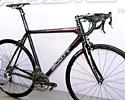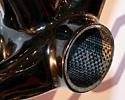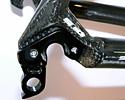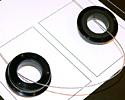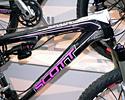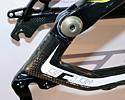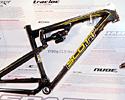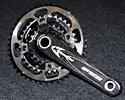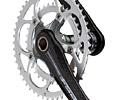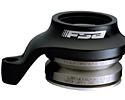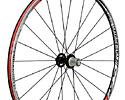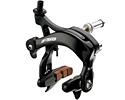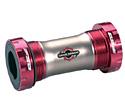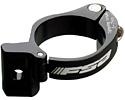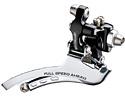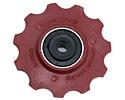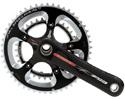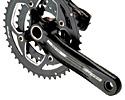
Recently on Cyclingnews.com |
Eurobike show
Germany, August 31-September 3, 2006
Main Page Previous Part Next Part
Part 4: Scott & FSA lighten up and branch out
ScottUSA introduces a new, even lighter, carbon fiber road and mountain bike frames while it really is Full Speed Ahead with new components from the compact crank company, as James Huang reports.
ScottUSA continues to push carbon fiber technology with Addict and Spark
ScottUSA claims to have developed the world's first 100 percent carbon fiber frame with its Addict road frame which weighs in at a remarkable 790g. Scott uses a new IMP technique (Integrated Molding Process) to mold the one piece top tube/head tube/down tube assembly as well as the chainstays and brand-new fork. According to Scott officials, IMP differs from other molding techniques in its enhanced ability to more precisely control the interior dimensions of the parts. The new front end is reported to shed 11 percent of material relative to the CR1's tube-to-tube construction and also boasts improved strength due to the enhanced shaping and the removal of stress concentrators. The CR1 construction method is still used for the remainder of the frame.
In addition to the new construction method, weight savings were found in virtually every other area of the frame. The CR1's then-distinctive 'fish scale' carbon fiber cosmetic surface layer has been abandoned in favor of a lighter unidirectional carbon finish. The Addict also now uses carbon fiber instead of aluminum for the new molded dropouts, braze-on-style front derailleur mount, and cable stops.
Scott also developed a unique set of bottom bracket cups in conjunction with Shimano. In contrast to the conventional threaded cups, the new SMI-FC-7800 cups press directly into bare carbon fiber. This not only eliminates the threads, but also allows Scott to completely remove any metal at all from the bottom bracket shell. Scott will have an exclusive license to use the new press-fit system for the 2007 model year, but expect other manufacturers to follow suit for '08 when Shimano will make the system available to everyone.
Although the original CR1 frame was a technological knockout, the accompanying fork was generally regarded as somewhat of a disappointment in relation at nearly 400g. The new Addict SL fork seeks to shed that reputation with a greatly improved weight of 330g. IMP is used here as well, along with a set of new carbon fiber dropouts.
Geometry-wise, the Addict is aimed more at road and stage racing than the CR1, with a longer top tube, shorter head tube, and half-degree shallower seat tube angle. The CR1 has now been repositioned as more of a high-performance road bike being specified with more comfortable saddles and slightly more upright handlebars.
Scott's woes on the off-road side of things have been well documented as the Horst Link-equipped Genius bikes were banned for sale in the key US market due to patent infringement. For 2007, Scott has replaced the shorter-travel Genius RC with the Spark, a 110mm travel carbon fiber platform that weighs just 1790g including the integrated seatpost and rear shock. The Spark will wear a modified single-pivot suspension design that will be available stateside.
Many of the same innovations used on the road-going Addict are also seen here with an IMP one-piece top tube/head tube/down tube assembly, bare unidirectional carbon finish and carbon fiber dropouts. Scott also graced the new Spark with a new HMX composite fiber which is said to offer a 20 percent increase in stiffness over Scott's usual HMF fiber. The tried-and-true CR1 process is used for the rest of the frame, including the full carbon fiber asymmetric rear triangle.
DT Swiss will produce the Spark's 240g Nude TC rear shock. Riders will use a new handlebar-mounted Tracloc remote lever to select one of three travel settings: 110mm 'All Travel' mode, 70mm 'Traction Control', and full lockout. The shock sag will also be adjusted in tandem with the travel adjustments, which Scott says will provide more appropriate bottom bracket heights and head tube angles for each given setting.
The top-end technology found on the new Addict and Spark will also be made available in Scott's women's-specific Contessa line. Frame geometries are unchanged from the standard versions but all associated componentry is altered where appropriate and the sizing range is adjusted downwards.
Third generation carbon cranks and more ceramic bearings from Full Speed Ahead
Component maker FSA continues to advance its carbon fiber range with the new K-Force Light crankset. Using an "FSA-exclusive" military technology, the new K-Force Light arms boast a hollow I-beam cross section that sheds 130g relative to last year's standard K-Force cranks while relinquishing little, if any, rigidity or durability.
FSA's commitment to compact gearing is emphasized here as the new crankset won't even be offered with the previously 'standard' 130mm BCD pattern. The enhanced versatility of the 110mm bolt circle diameter is undeniable, though, particularly as chainrings will be available in a wider range of sizes for 2007, including 48/50/52T outer rings and 34/36/38T inners.
In spite of the substantially lighter 620g total weight, the new K-Force Light will only command a price premium of about US$30 over the standard K-Force, which is particularly surprising when you consider that FSA's ceramic-bearing equipped BB-8000 bottom bracket will now come as standard equipment on the top model. Only a road version will be offered initially for 2007, although MTB prototypes have already been completed and may see the light of day shortly after the first of the year.
The new Team Issue crankset isn't the lightest or stiffest in the line, but it is significant nonetheless. Many of you will remember that FSA worked with SRM a while back to develop the first SRM crankset with carbon fiber crankarms. The Team Issue crankset uses the same crankarms but with a removable conventional aluminum spider. What this means is that buyers can pick up this crankset and later upgrade it with a SRM power-measuring unit later on if they so desire.
FSA's new RD-440 wheelset hits the scales at a light 1380g for the pair (without skewers). The RD-440's semi-aero 26mm deep magnesium alloy rims are both lighter and stiffer than comparable aluminum ones, and are also better able to damp road vibration. FSA treats the normally-reactive material with two coatings: one to prevent corrosion, and the other to improve braking performance.
The magnesium rims are laced with aero stainless steel spokes (20f/24r) to a pair of CNC-machined hubs, both of which will include a full complement of fast-running hybrid ceramic cartridge bearings as standard equipment. Along with FSA's RD-220, RD-88, and RD-400 EU, the new RD-440 will also be completely handbuilt in Italy and serially numbered. The new wheels will only be available for use with clincher tires.
Much hype has surrounded FSA's rumored road and mountain shifters and derailleurs, but the company was still rather mum on any details, only saying that it hopes to have complete prototypes completed sometime in 2007. Regardless, FSA still will offer two road brakesets as well as a pair of road front derailleurs.
The dual-pivot SL-K and Energy road brakes both feature a shortened upper arm that is reinforced with an additional brace for more rigidity. FSA outfits the brakes with Kool-Stop DL dual compound pads, which it claims offers the best overall dry and wet performance on aluminum rims. The SL-K will come with titanium hardware while the Energy will come equipped with chromoly hardware.
Not surprisingly, both front derailleurs are fully compatible with compact drivetrains. Both will be offered in braze-on and clamp-on varieties, the 34.9mm version of which will feature a unique clamp to prevent damage on thin-walled carbon fiber or aluminum seat tubes. As with the brakes, the Energy and Gossamer front derailleurs will differ only in hardware and finish.
Photography
For a thumbnail gallery of these images, click here
Images by James Huang/Cyclingnews
- A top-level Addict LTD complete bike will weigh somewhere around 13lbs, but the total cost will be an equally staggering US$11000.
- Scott lightens up the fork for the Addict with the new Addict SL fork. Carbon dropouts and Scott's new IMP manufacturing technique drop the fork weight down to 330g.
- No metal threads are required here as the Addict uses a press-fit bottom bracket design. Scott will have an exclusive on the new Shimano cups for the first year.
- Carbon, carbon everywhere. The Addict uses carbon fiber dropouts with a replaceable hanger.
- How light can it get? Scott's new Addict weighs a remarkable 790g. You might not want to sit on that top tube too long while you're waiting at the café; the walls are awfully thin.
- The Addict uses absolutely no metal anywhere, as seen in these carbon fiber cable stops.
- The Addict LTD will use an integrated seat mast. The standard Addict will use a conventional seat post arrangement.
- Women no longer have to settle for second best. In a growing (and welcome) trend, Scott offers its top road and MTB bikes in women's-specific varieties.
- Carbon fiber is also used for the front derailleur tab on the new Addict.
- Scott has a full line of clothing, parts, and accessories in Europe, but the US will see its clothing stateside for the first time next season.
- Scott will import its mountain bike shoes into the US for next season. Scott will pair with Crank Brothers during the Interbike On Dirt Demo later this month.
- Scott outfits its bikes with its house-branded tires which will now be available in the US aftermarket.
- A minimal linkage drives the DT Swiss-built rear shock on the new 110mm travel Spark.
- The Spark's Nude TC rear shock will feature adjustable air preload, rebound damping, and three travel settings which will also adjust the shock sag.
- Scott worked with Shimano to develop a pair of press-fit bottom bracket cups for the new Addict.
- Scott's road shoes will see the light of day on US soil for the first time next year.
- Scott factory rider Niki Gudex is also a graphic designer who contributed to the look of the women's specific Contessa line.
- Carbon fiber dropouts help to further lighten up the new Spark. Thankfully, a replaceable rear derailleur hanger is used.
- 1790g including the rear shock - the Scott Spark is easily among the lightest full-suspension frames out there.
- The main pivot on the new Spark is minimal in appearance but still makes use of cartridge bearings.
- Scott couldn’t sell its Genius line in the US due to patent infringement, but the new Spark uses a modified single-pivot layout which carries no such restrictions.
- FSA will only offer a road-going version of its new K-Force Light crank for now, but prototype versions for MTB use have already been produced. Expect to see them show up later on this year.
Images by FSA
- The new Team Issue crankset uses a fairly normal arrangement of carbon fiber crankarms paired with an aluminum spider. However, the crankarms are identical to those used on its SRM-compatible version which means the system can be retrofitted later on.
- Ok, this isn't new for '07 - but it's still really cool. FSA integrates a cable hanger directly into the upper half of its integrated and hidden cup headsets for use on cyclocross bikes. Sadly, this arrangement is mysteriously absent from its conventional headsets.
- The new RD-440 wheels use a pair of magnesium rims that are not only lighter, but also stiffer than aluminum, plus they damp more vibration.
- FSA is fully committed to compact 110mm BCD gearing and expands the range of chainring offerings for 2007.
- The SL-K brake uses a short upper arm and a supplemental brace for rigidity. Kool-Stop DL pads are said to offer the best overall dry and wet performance on aluminum rims.
- FSA's ceramic bearing-equipped MegaExo bottom bracket is faster rolling, more durable, and even a bit lighter than standard stainless steel bearings.
- The unique geometry of FSA's 34.9mm clamp helps to prevent damage on thin-walled carbon fiber and aluminum seat tubes.
- FSA doesn't have its full component groups yet, but it does have a pair of compact-compatible front derailleurs in both braze-on and clamp-on varieties.
- FSA expands its ceramic bearing arsenal with derailleur pulleys to fit both Shimano and Campy rear derailleurs.
- FSA also has ceramic bearing kits for use on a variety of its other wheels as well as a number of Mavic road wheelsets.
- FSA now offers an alternate version of many of its road handlebars which have a closer reach, shallower drop, smoother bend, and longer center section for easier mounting of accessories such as computers.
- The new FSA K-Force Light crankset shaves 130g off of last year's K-Force through the use of hollow carbon crankarms.
- A new mid-level MTB crank from FSA offers cold-forged aluminum arms and a MegaExo bottom bracket for less than US$150.

